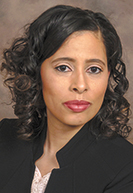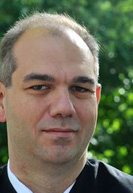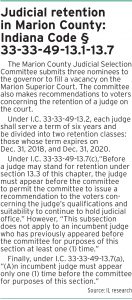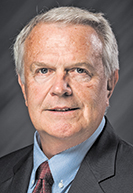Subscriber Benefit
As a subscriber you can listen to articles at work, in the car, or while you work out. Subscribe NowSome judges on the Marion Superior Court want the Marion County Judicial Selection Committee to have a more prominent role in the retention process, but that would likely require a change to legislation passed in 2017.

In the absence of a legislative change — which could be difficult to accomplish in the upcoming short session of 2024 — the judges asked the selection committee to consider encouraging a more informal approach to retention that would include, among other things, requiring sitting judges to appear before the committee more than state statute currently calls for.
The three judges — Charnette Garner, Heather Welch and Marc Rothenberg — met with the selection committee Sept. 12. They said the change would be good for transparency and accountability.

Garner and Rothenberg are current members of the four-member Marion Superior Court Executive Committee, with Garner serving as presiding judge. Welch is a former presiding judge.
The 14-member selection committee consists of four attorneys appointed by legal associations, four members selected by legislative leaders, four members appointed by the chairs of both political parties, one vice chair and one Indiana Supreme Court justice who serves as chair.
Indiana Chief Justice Loretta Rush is the current chair.
Legislative background
House Enrolled Act 1036, passed in 2017, established the selection committee.
In most of Indiana’s 92 counties, judges run for election. Marion County is one of four — also including Allen, Lake and St. Joseph counties — where a local commission is tasked with reviewing applications, interviewing applicants and submitting finalists to the governor, who then appoints a judge to fill a vacancy.

Along with vetting judges to fill vacancies, the Marion County Judicial Selection Committee was made responsible for making a recommendation to voters regarding the retention of a judge on the superior court, a statutory role not present in the other three counties.
HEA 1036 said the committee should consider a candidate’s law school record, contribution to scholarly journals, activities in public service and whether the candidate “reflects the diversity and makeup of Marion County,” among other things, when weighing its recommendation for retention.
But that process was limited. Judges only had to go before the committee once for retention purposes and aren’t required to do so again.
Specifically, under Indiana Code 33-33-49-13.7, “an incumbent judge must appear only one (1) time before the committee for purposes of this section.”
The legislation created two retention classes: Class A, which includes the 20 judges whose terms expired in 2018, and Class B, which includes the 16 judges whose terms expired in 2020.
 Even though legislation doesn’t require judges to go to the selection committee for retention more than once, Rothenberg told the committee nothing in the statute prevents committee members from gathering information on judges through bar association surveys and other means — including simply inviting the judges in for a meeting.
Even though legislation doesn’t require judges to go to the selection committee for retention more than once, Rothenberg told the committee nothing in the statute prevents committee members from gathering information on judges through bar association surveys and other means — including simply inviting the judges in for a meeting.
After the meeting, Rothenberg told Indiana Lawyer it’s an open question whether judges who are up for retention could still go before the committee again.
“I think that they’re more than willing to talk to any of us who want to talk to them,” he said of the committee, “but not required by statute.”
What seems clear is that state law doesn’t give committee members as much power as the three judges who went before them would like.
“Do we need a legislative change for the governance of the day-to-day on our court?” Welch said to IL. “I think our answer is yes, because what we see right now is not working.”
‘There’s a reason we’re here’
The three judges pitched the change to the selection committee as a two-pronged approach.
First, they said, it would increase transparency for the public if the committee were to give feedback and inform voters.
“It will allow the public to get a glimpse of the work we do as judges,” Rothenberg told the selection committee.
Second, judges said they hoped it would increase accountability.
Rothenberg said not every judge is willing to do “extra work” — such as serve on the court’s Executive Committee or work with the bar association — which makes it frustrating for those who are.
“There’s a reason we’re here,” he said.
Welch shared a similar sentiment, saying there are challenges with a “sufficient work ethic.”
There would need to be “some pressure from the courts above us,” she said, anticipating that it will be difficult to get all judges on the same page.
Will it change?
Some selection committee members said during the meeting they were surprised to learn judges wouldn’t have to come back to them for retention more than once.

Still, Katie Jackson-Lindsay, an attorney appointed to the selection committee by the Marion County Bar Association, said during the meeting that she didn’t think the statute would change to create more accountability. And Welch noted it’s unlikely a lot of legislation gets through in a non-budget session, anyway.
But Rep. Greg Steuerwald, R-Avon, who authored the 2017 legislation that created the selection committee and spelled out its role in the retention process, said he would be open to the change.
“If that’s what they want, I’m more than happy to consider,” he said.
A spokesperson for the Indiana Supreme Court told IL in an email that Chief Justice Rush is asking the selection committee to meet again to “discuss procedures” for the judges who are up for retention in 2025.
A date for the public meeting wasn’t set by IL deadline.•
Please enable JavaScript to view this content.

